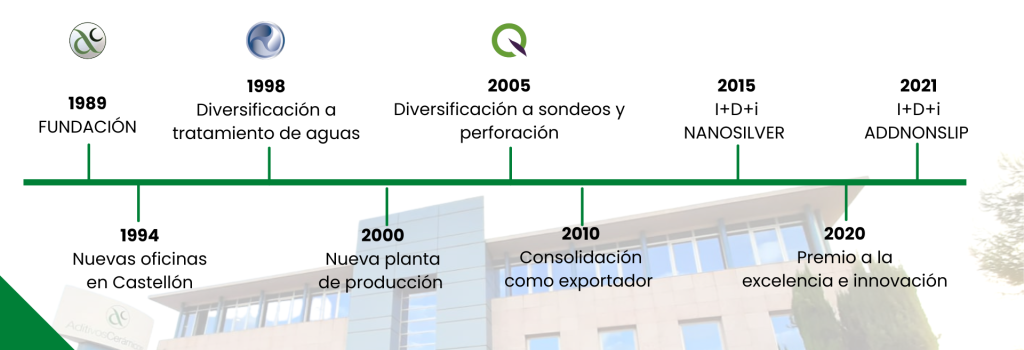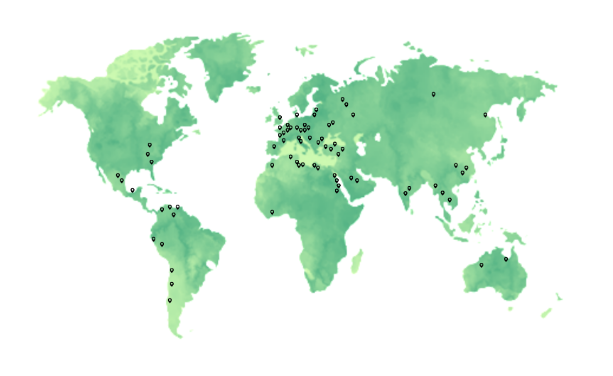Presentación
Aditivos Cerámicos lleva 30 años ofreciendo soluciones dirigidas al sector de la cerámica y la porcelana.
Su crecimiento continuado durante este tiempo ha sido consecuencia de una apuesta decidida por la innovación y la búsqueda de nuevas oportunidades. Fruto de esta política a día de hoy la empresa ha diversificado en múltiples sectores industriales a través de nuevas empresas independientes, pero siempre manteniendo los formulados químicos y la investigación como eje central de su negocio.
Empresas del grupo
Nuestra historia

Investigación, Desarrollo e Innovación
Desde sus inicios la dirección de Aditivos Cerámicos ha apostado por la innovación y la investigación como ejes donde consolidar el crecimiento y el futuro desarrollo de las empresas del grupo.
Fruto de esta política nuestras empresas se han convertido en un referente nacional en el desarrollo e implementación de proyectos de investigación, tanto a nivel nacional como europeo.
Nuestra convicción de que la inversión en I+D+i es el camino para garantizar un crecimiento sostenible y prolongado nos ha llevado a cooperar y liderar proyectos de envergadura.

Misión y Visión
La misión de Aditivos Cerámicos, S.L. es convertirse y mantenerse en el top de los proveedores de productos químicos para los sectores de la cerámica general, sanitarios, vajillería y porcelana, impresión digital y otros a nivel mundial.
Nuestra visión es la de facilitar la fabricación de piezas cerámicas de cualquier tipo a través de la proporción de los mejores productos químicos involucrados en el proceso y la mejor asistencia técnica del mercado a nivel global.
Nuestros principales proyectos de investigación
ORGANO: IMPIVA PROGRAMA: INVESTIGACIÓN Y DESARROLLO TECNOLÓGICO Nº EXPEDIENTE: NANOCRETE IMITDA/2010/483 ABSTRACT Work on carbon sequestration in subterranean formations has renewed interest in investigating the long term effects of CO2 on Portland cements. Conventional Portland cement it far from being the optimal sealant for injection wells. In order to improve the sealant properties of Porland cements, Aditivos Cerámicos will develop special chemical additives based on nanochemistry to reduce porosity, increase the cement resistance to shear stress and that will react with the injected CO2 in order to improve the long term effectiveness of the wellbore sealant.
ORGANO: IMPIVA PROGRAMA: INVESTIGACIÓN Y DESARROLLO TECNOLÓGICO Nº EXPEDIENTE: EUREKA PROJECT E!4118 SOLARENERGY ABSTRACT The general objective of the current project is the development of heat bearer fluids with adequate work ranges for its use in systems for production of thermal solar energy of low and medium temperature. The positive results of this project were The origin of QUIMACER. Thanks to the innovative heat transfer fluids this company was positive introduced in a declining market with steadily declining prospects due to the construction industrial crisis in Spain.
ORGANO: PROGRAMA: ENV.2013.WATER INNO&DEMO-1 Nº EXPEDIENTE: FP7-ENV-2013-WATER-INNO-DEMO Project objectives: Heavy metal pollution is one of the most important environmental problems today even threatening human life. A large number of industries produce and discharge wastes containing different heavy metals into the environment and do not comply with current EU directives. BIOMETAL DEMO project aims at demonstrating the feasibility of the application of novel biotechnologies for the treatment of metal polluted wastewaters though the development of two pilot plants to be implemented in two metal polluting representative industries which are a mine and an electroplating company. Actual metal treatment technologies implemented in polluting industries fail to comply with the reduction of metal concentration required by the EU for wastewater treatments. For this reason, new technologies will be developed to overcome this problem.
The biotechnologies that will be evaluated in BIOMETAL DEMO project will be: metal bioprecipitation by sulphate-reducing bacteria and immobilized phytase biocatalysis, and metal biosorption on agricultural industry by-products and biopolymers such as alginate & chitosan based materials. After the evaluation of these techniques, an optimized bioprocess or a synergy of two integrated bioprocesses will be selected to design and build two demonstration pilot plants for scaling-up the metal removal biotreatment. The feasibility of the application of the selected bioprocess will be explored at pilot plant scale in acid mine drainage and electroplating wastewaters contaminated with heavy metals. The operation will be monitored and optimized, and the kinetics and the performance of the metal removal/recovery bioprocess will be integrated within the pilot demonstration plants. Finally, an economic, social and technical analysis of the benefits of such tertiary biotreatment of metal polluted industrial wastewater will be carried out for the corresponding and related industrial sectors across EU.
ORGANO: PROGRAMA: LIFE+, WATER Nº EXPEDIENTE: LIFE12 ENV/ES/000265. Project objectives: ADNATUR main goal is the validation, assessment and industrial demonstration of a new innovative and environmentally friendly technology, based on natural products, in primary treatment of wastewaters, at urban and industrial level. The implementation of the new technology at EU level will constitute an economical, technical and environmental improvement, deriving in energy and resources save and no production of wastewater or hazardous chemical waste during the physical-chemical treatment of industrial or urban wastewaters. To demonstrate these advantages, two wastewater treatment industrial-scale prototype plants will be designed, assembled, and tuned in order to put it into operation in different real end-users facilities.
The proposed technique will be demonstrated at industrial level in two Spanish companies from textile and ceramic sector (Prototype A) and at urban wastewater level (Prototype B) Specific Objectives: – Assessment of natural based coagulants in different matrix, before industrial scale demonstration, including determination of the efficiency and validation of the eco-innovative treatment technology. – Design and complete assembly of the two prototypes: first on industrial wastewater treatment and second on urban wastewater. Optimisation of the dosage and treatment units of both prototypes. – Both prototypes will be installed, adjusted, integrated and finally tuned, just in the end-user facilities, before every industrial scale assessment and validation – Assessment and validation of the proposed eco-innovative treatment technology. – Contribute to Water Framework Directive (WFD), address Urban Waste Water Treatment Directive and Directive for Integrated Pollution and Prevention Control (IPPC), addressing pollution from industrial installations – Wastewater management improving the level of the water quality and water efficiency – Dissemination and transference of the results to the main stakeholders
ORGANO: PROGRAMA: LIFE+, WATER Nº EXPEDIENTE: LIFE11 ENV/ES/552 BIOMOMI. Project objectives: The principal aim of the project is to validate and demonstrate a new technology that allows the real time monitoring and quantifying of aerobic microorganisms present in the water of a hydraulic system, and the subsequent corred dosage and constant optimisation of an adequate biocide to minimise these microorganisms. To this end, an industrial-scale prototype of the plant will be constructed and put into operation to demonstrate the technique in two representative Spanish textile companies with very different hydraulic systems, both of whom require disinfection systems: the cooling towers of a finishing company and the air-conditioning system of a weaving company. Effects of the biocides on the states of environment: All the living being can be suffer oxidation processes. Land degradation and soil erosion processes, (e.g. disappear fungus and microorganism) Surface corrosion processes. Carcinogenic and harmful halogenated generation substances in surface water. Skin alterations and irritations in all kind of living being. Atmospheric contamination because of the chemical products and biocides taking part of small droplets of water from the system spray emissions. When the biocides are in the air suffer all kind of reactions and chemical transformations which increase the polluting agents in the air.
Ecological disequilibrium processes which change the natural controls of the plagues. This system significantly improves the disinfection management in hydraulic systems making the process more effective, due to the fact that detection is continuous and can be carried out at several installation points (where the concentration and type of biocide is variable, so the disinfection can be customised). Currently, these systems must be disinfected and a residual amount of biocide product must be kept, independently of the microbiological contamination. The new method proposed in this project will optimize the biocide amounts to be dosed at any given moment, so extra amounts or extra residual of biocide are reduced (as well as packaging), making the process cheaper and more environmentaly-friendly. In the case of the air-conditioning system, the advantages are even greater. The only type of biocide treatment possible on these installations is chlorine, as the humidified air circulated in the interior of buildings comes into direct contact with operatives.
Chlorine regulation must remain within strict margins (0.6 and 0.8 ppm active chlorine), which is fairly complicated and even impossible to achieve with existing methods and chlorine concentrations below or above these safe points are frequently detected. This method would be valid for the disinfection of any type of hydraulic system, independent of the industrial process being performed, and could obviously work in any other country or sector. Specific Objectives: The study and optimisation of the synergetic effect of both oxidising and non-oxidising biocides and the determination of the compatibility between both types for the water intake corresponding to the
ORGANO: PROGRAMA: CIP Eco-innovation, Call Identifier: CIP-EIP-Eco-Innovation-2011. Nº EXPEDIENTE: ECO/11/304421 e-GreenWater Project objectives: e-GreenWater is the electrolytic disinfected and recycled process water in greenhouses. Its unique innovation is the electrolysis of the water itself without addition of salt or chemicals. The unique selling propositions (USP) of e-GreenWater are (1) Patents and expertise of chemical free disinfection, better for the plants, roots and leaves, (2) its high efficiency against resistant microorganisms, (3) its eco-friendly way of water treatment through recycling of process water and saving of fertilizers, (4) its very low energy consumption, (5) its reasonable prices. EHEC and numerous reports of resistant germs in vegetables show the necessity to improve the hygienic quality in the food industry, especially in greenhouses is the hygienic security sensitive and important. The customary chemical disinfectants or treatment using UV or heating are not effective enough against such resistant microorganisms. Major achievements of e-GreenWater will be: A chemical-free food safety solution Effective inactivation of germs, virus and fungi which are resistant against customary chemicals Better tolerance of roots and leaves which are sensitive to chemical disinfectants or biocides Saving one third of fertilisers through reuse of nutrients in recycled process water after effective elimination of pathogenic germs Wastewater free greenhouses (meeting the EU law until 2020) Replacement of aggressive and polluting chemical disinfectants (biocides) Market success through high benefits but competitive prices.
ORGANO: IMPIVA PROGRAMA: INVESTIGACIÓN Y DESARROLLO TECNOLÓGICO Nº EXPEDIENTE: IMIDTA/2011/372 RESULTADOS OBTENIDOS Estudio de bioeficiencia de diversos productos biocidas bajo las mismas condiciones de trabajo.
ORGANO: IMPIVA PROGRAMA: INVESTIGACIÓN Y DESARROLLO TECNOLÓGICO Nº EXPEDIENTE: IMIDTA/2011/380 RESULTADOS OBTENIDOS Tecnología innovadora para el control y prevención de la Legionella. Este proyecto de I+D representa una inversión total estimada de dos millones de Euros.
ORGANO: IMPIVA PROGRAMA: INVESTIGACIÓN Y DESARROLLO TECNOLÓGICO Nº EXPEDIENTE: IMIDTP/2009/455 RESULTADOS OBTENIDOS Confirmación de la eficacia del nuevo biocida sintetizado a escala de laboratorio y semi-industrial y, por otra parte, el estudio de su aplicación en campo, tomando como ejemplo alguna empresa de sectores industriales diversos. A continuación, se presentan los resultados experimentales obtenidos en el proyecto, describiendo entre otros, el método de síntesis, los ensayos de bioeficiencia, el modo de utilización, su comportamiento frente a diferentes tipos de muestras o algunas aplicaciones alternativas del producto.
ORGANO: Direct. Environ. E.C./ liderado por AITEX junto a SERVYECO, ATEVAL, UPV y PASCUAL Y BERNABEU S. PROGRAMA: LIFE+ Nº EXPEDIENTE: LIFE07 ENV/E/000794 TEXLEGIO (LEGIOTEX) 2009-2011 RESULTADOS OBTENIDOS Tecnología innovadora para el control y prevención de la Legionella. Este proyecto de I+D representa una inversión total estimada de dos millones de Euros.
ORGANO: IMPIVA PROGRAMA: INVESTIGACIÓN Y DESARROLLO TECNOLÓGICO Nº EXPEDIENTE: IMIDTA/2007/576 RESULTADOS OBTENIDOS Selección mediante ensayos de laboratorio de diversos elementos para la prevención de la entrada de Legionella a una instalación como puede ser lámparas ultravioleta, generadores de ozono, materiales filtrantes, incluso un sistema para la eliminación de materia orgánica mediante oxidación fotocatalítica que impida su contribución a la formación de biocapa. Del mismo modo se han estudiado diversos tratamientos químicos para el control de Legionella una vez ha alcanzado y colonizado las instalaciones de riesgo, tomando como criterio de selección el potencial ecotoxicológico de los productos químicos utilizados cuando quedan como residual en las aguas tratadas, en combinación con la eficacia.
RSC



La política medioambiental en Aditivos Cerámicos, S.L.
Es un deber medioambiental tratar de compatibilizar las exigencias propias de las actividades económicas e industriales con el máximo respeto al medio ambiente natural.
Su protección es un compromiso que Aditivos Cerámicos S.L. asume, estableciendo una Política ambiental aplicable a todas las actividades de la organización. Aditivos Cerámicos S.L. adquiere el compromiso de protección del medioambiente en su Política Medioambiental.
Los principios básicos que rigen la Política ambiental de Aditivos Cerámicos S.L. son:
Protección del Medio ambiente: La protección del Medio Ambiente es una responsabilidad de la dirección y exige a todos nosotros un comportamiento responsable. Se establecen metas y directrices concretas de desempeño ambiental en todas las áreas de actividad de la empresa.
Compromiso con los requisitos legales aplicables: nos comprometemos abiertamente al cumplimento de la normativa ambiental vigente y de otros requisitos legales relacionados con nuestros aspectos ambientales. Se garantiza la consideración de los requisitos legales vigentes en materia de protección ambiental en las decisiones de la empresa y su aplicación a través de las medidas que se adopten.
Mejora continua del desempeño ambiental: nuestro compromiso de mejora continua y de prevención de la contaminación busca un mejor desempeño ambiental, teniendo en cuenta las técnicas de proceso aplicadas y los productos empleados. Se fomentará el mejor uso de los recursos naturales mediante el empleo de las mejores tecnologías, minimizando de esta forma la generación o emisión de cualquier tipo de contaminante o residuo.
Gestión: El sistema de gestión ambiental se integrará dentro de la gestión global de Aditivos Cerámicos S.L. El sistema contendrá normas, manuales e instrucciones así como procedimientos de evaluación y auditoría. Periódicamente revisamos en nuestra empresa el sistema de gestión ambiental, al objetivo de detectar puntos débiles y poder disponer de las acciones necesarias.
Formación y toma de conciencia: la puesta en práctica de la política ambiental depende de manera fundamental de la toma de conciencia y formación den todos los ámbitos de la organización. La conciencia ambiental de todo el personal de Aditivos Cerámicos S.L., incluyendo aquellos que realicen trabajos en su nombre, se fomentará de forma continua con los adecuados programas de formación y sensibilización.
Formamos a los empleados sobre los aspectos ambientales ligados a nuestra actividad y las funciones de cada uno, de forma que sean conscientes de los posibles impactos adversos de su trabajo y permita mejorar su desempeño ambiental.
Proveedores y contratas: incorporaremos progresivamente a las partes interesadas a nuestros esfuerzos por mejorar la protección ambiental. Informamos a nuestros proveedores y contratistas sobre nuestra política ambiental y exigimos su compromiso para cumplir con dichas directrices.
Comunicación: la comunicación con las autoridades, las comunidades locales y el público en general será fluida, realizando la difusión de nuestra política ambiental y respondiendo a las legítimas demandas de información.
Con la firma de este documento, la dirección de Aditivos Cerámicos S.L. se compromete a su aplicación, solicitando la colaboración de todas las personas de la organización para su consecución.
Política de calidad
La política de calidad de Aditivos Cerámicos, S.L. se fundamenta en la mejora continua de todos nuestros procesos, productos y servicios con el fin de garantizar que nuestros colaboradores reciben un trato personalizado, eficiente y respetuoso, tanto a nivel comercial como administrativo y financiero.
Los objetivos genéricos de esta política de calidad son:
– El asegurar que los productos fabricados, los servicios así como los requisitos legales y reglamentarios satisfacen todas las necesidades y expectativas del cliente, con el objetivo de conseguir su fidelización y mantener, así, una relación duradera y estable.
– La potenciación de los recursos humanos, fomentando el trabajo en equipo y la formación.
– Alentar, ayudar y apoyar todas aquellas acciones preventivas que se anticipen a la aparición de problemas, tanto internos como externos.
– Efectuar acciones correctoras ante cualquier queja o reclamación de nuestros clientes internos y externos.











